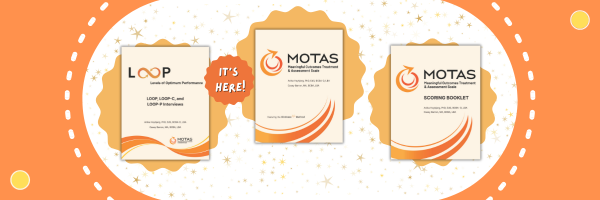
By Anika Hoybjerg, PhD, EdS, BCBA-D, LBA and Casey Barron, BCBA, LBA
MOTAS Creation
Applied Behavior Analysis (ABA) therapy is an evidence-based practice commonly used when working with individuals who are on the autism spectrum. In ABA treatment, criterion referenced assessments are often used to assess current skills levels, develop goals to acquire new skills, and measure progress.
These assessments are useful tools in providing a structure on what skills to teach individuals, however there are certain gaps that have been observed that inspired the creation of the Meaningful Outcomes Treatment and Assessment Scale (MOTAS) and companion Levels of Optimum Performance (LOOP) interviews. These include aligning treatment goals with parent and family priorities, comprehensive care across the lifespan, and inclusion of teaching skills to increase flexibility that are a barrier to learning.
Parent Priorities
An important aspect of providing treatment to individuals with autism and related disabilities is to collaborate with parents, caregivers, and others who know and love the person. This includes incorporating their goals, values, and feedback into treatment. Understanding what barriers are preventing an individual from participating in desired hobbies, gaining friends, being with family during important moments or events, or participating in education and extracurricular activities are crucial to developing a comprehensive care plan that meets the needs of the individual and their loved ones who are supporting them. Having a structured interview and record of parent, caregiver, and client preferences, goals, and thoughts was one of the motivations when creating the MOTAS.
Additionally, in the time the authors have spent working with families, a pattern emerged when having discussions about goals for the future of their families. It was observed that some of the most important skills families wanted to work on were not part of current assessments. Goals such as going into novel locations for family events, tolerating unexpected changes in daily routines, understanding their siblings’ perspectives, establishing and maintaining relationships, and so many other skills were not addressed in a comprehensive way.
While this does not prevent professionals from addressing these skills in treatment, it can make it difficult to demonstrate progress when updating assessments. Demonstrating progress through increasing scores on skill assessments is often a recognized metric by insurance companies who are responsible for approving and paying for treatment.
Flexibility
Despite one of the core characteristics of autism being restricted and repetitive behavior, this is not comprehensively addressed in existing assessments. Restricted and repetitive behavior is useful in many regards, however for some individuals, disruptions to changes in routine may cause distress, and for some may lead to instances of maladaptive behavior. Lack of inclusion on assessment does not prevent individuals from working on these skills, however it may result in difficulty demonstrating progress for payors, and rigidity and inflexibility may be a barrier to acquiring other skills.
While respecting routines and rituals is important, there are also times when teaching flexibility is important. The goal of working on flexibility is to help individuals gently bend without breaking or inducing trauma. Life is unpredictable, and developing flexibility helps one to navigate many situations with ease and comfort. Flexibility is usually required when things don’t go as expected, routines change, and we are required to adapt to these unexpected changes.
Meeting the Needs of a Variety of Individuals
Several commonly used assessments are widely used in the field of ABA to address early language skills, guide treatment according to early developmental milestones, and prepare individuals for living alone in some environments. However, gaps were noticed when attempting to select goals and develop treatment plans for individuals who are seeking to establish and maintain relationships, developing perspective taking skills, working on advocating for themselves, and are learning to adapt to unexpected changes in their day. The MOTAS includes skills related to each of these domains, and several others. The skills within each domain can be taught to individuals with varying communication styles, and facilitate functional, independent, and meaningful skills into adulthood.
Further Reading
Introducing the Meaningful Outcomes Treatment and Assessment Scale
Using the MOTAS and LOOP: Selecting Meaningful Goals
About the Authors
Anika Hoybjerg, PhD, EdS, BCBA-D, LBA
Dr. Hoybjerg is the CEO, founder, and owner of Autism & Behavioral Intervention (ABI) (a clinic-based ABA center in Draper, UT), ABA Education Center, and Integrity Billing. In addition to founding and leading these companies, Anika has worked in public schools and in private sectors with children and families for over 20 years. Anika is a Doctoral level Board Certified Behavior Analyst (BCBA-D) and a Licensed School Psychologist. Anika has a Bachelor’s degree in Human Development, a Master’s Degree in Curriculum and Instruction with an Emphasis in Autism, a Master’s degree in Human Exceptionality, an Ed.S in School Psychology, and a Ph.D. in Applied Behavior Analysis. Anika is currently pursuing a Master’s degree in Neuroscience and Trauma. Anika has presented at regional, national, and international conferences on a variety of topics relating to kindness in ABA services, autism, collaboration, and assessments.
Casey Barron, BCBA, LBA
Casey is a practicing Board Certified Behavior Analyst in Salt Lake City, Utah. She has been working in ABA since early 2015, spending several years first working as an RBT then as a BCBA in academic, home, and clinical settings. In addition to her work as a practicing BCBA, Casey works as the clinical director of an ABA center that has supported hundreds of children and where she oversees and trains staff members and future BCBAs. Since becoming a BCBA, Casey has presented at regional and international conferences on case studies from her own clinical practice.
